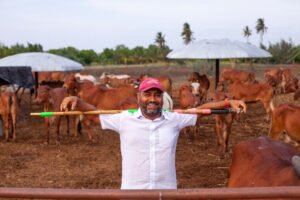Friday, 20 February 2026
Bezos Centre for Sustainable Protein opens at NSU
Backed by $30Mn from the Bezos Earth Fund, the centre aims to revolutionise sustainable protein research and commercialisation in Asia The Bezos Centre for Sustainable Protein at the National University of Singapore (NUS) was launched today,…

Backed by $30Mn from the Bezos Earth Fund, the centre aims to revolutionise sustainable protein research and commercialisation in Asia
The Bezos Centre for Sustainable Protein at the National University of Singapore (NUS) was launched today, marking a major milestone as the first of its kind in Asia to advance research in alternative proteins. With a $30 million grant from the Bezos Earth Fund, the Centre is poised to lead groundbreaking research and commercialisation efforts to develop “ultimate proteins” – advanced hybrid foods that match traditional meat-based products in both taste and price.
By focusing on regional preferences and addressing the urgent challenge of feeding a growing global population, the Centre aims to drive global food security and accelerate innovation across the region. A priority area will be biomass fermentation, which, for example, utilises tofu waste to feed algae, creating high-quality protein.
The NUS Centre joins similar Bezos Centres at Imperial College London in the United Kingdom and North Carolina State University in the United States, forming a global network dedicated to advancing sustainable protein research. The Centre’s primary focus areas include microalgae and biomass fermentation, supported by complementary research into cultivated meat and plant-based technologies. These efforts are strategically aligned to produce next-generation hybrid proteins that are affordable, nutritious, and widely accepted.
“NUS and the Bezos Earth Fund are united by a shared commitment to actively combat climate change. The world’s growing appetite for meat has put a huge strain on our global food system, and we need to develop sustainable food solutions with researchers, government and industry,” said Professor Tan Eng Chye, NUS President. “With the generous support of the Bezos Earth Fund, we look forward to leveraging our unique position in Asia to drive innovation and collaboration across the region, ensuring sustainable protein solutions that benefit consumers and industry, and protect the environment.”
Technology
Tetra Pak extends paper-based barrier packaging to high-speed packaging lines in Asia
Feb 19, 2026 | Company News
Food Testing
Redefining Trust in Organic Foods through Independent Testing
Feb 13, 2026 | Food Safety and Testing
AFNOR International Eyes Global Food Safety Growth with HACCP Group Takeover
Feb 04, 2026 | Australia
More Popular
Strong Q4 Drives Coca-Cola Consolidated to Record FY2025 Results
Feb 20, 2026 | Beverages
The Kraft Heinz Company Appoints Nicolas Amaya as President, North America
Feb 20, 2026 | Company News
Orkla Food Ingredients acquires Senna
Feb 20, 2026 | Company News






